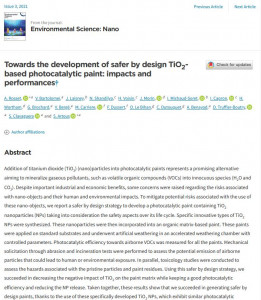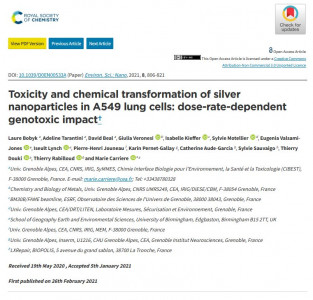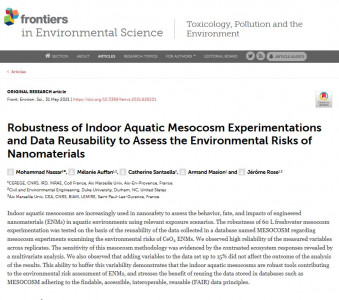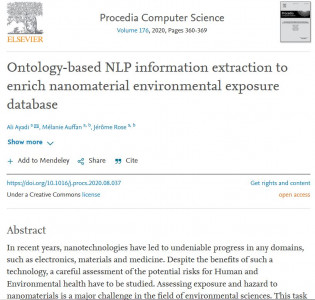Dear Colleague,
we would like to draw your attention to the symposium " Recovery and recyclability of nano- and micro- materials contained in advanced materials " (session 4.3)
to be held at the RST conference (Réunion des Sciences de la Terre) taking place in Lille, France, from 22- 26 October 2018.
https://rst2018-lille.sciencesconf.org
This symposium aims to bring together researchers and industrials working in the emerging and challenging field of recovery and recycling of nano- and micromaterials. Studies on the release of nano- and micromaterials to the environment are also welcome.
Conveners : Annette Hofmann (France), Brenda Omana-Sanz (France)
and Co-organisers : Vincent Jamier (Spain), Benjamin Gilbert (USA), Caroline Celle (France) Jean-Pierre Simonato (France) Laurent Charlet (France) Djadidi Toybou (France), Sylvia Lehmann (France), Christopher Vulpe (USA), Devrah Arndt (USA) Ludovic Lesven (France), Sophie Sobanska (France).
We would also like to draw your attention to the companion symposium on "Ecosystem Impacts and Toxicity of Advanced Materials and Nano-enabled Products" (session 4.4)
Please feel free to forward this message to interested colleagues.
Abstract submission dead-line for RST2018 Lille is 18 June 2018 :
For submission, go to : https://rst2018-lille.sciencesconf.org/user/submit?forward-action=submit&forward-controller=user&lang=en
Below is a full description of this session and the companion session.
We are looking forward to seeing you in Lille this autumn.
Best Regards,
Annette Hofmann, Brenda Omana-Sanz
and the co-organisers
Session 4.3 Recovery and recyclability of nano- and micro- materials contained in advanced materials
A. Hofmann, B. Omana-Sanz, V. Jamier, B. Gilbert, L. Charlet, C. Celle, J-P. Simonato, D. Toybou, S. Lehmann, C. Vulpe, D. Arndt, L. Lesven, S. Sobanska
Nano- and Micro- Materials (NM, MM) are increasingly used in the development of Advanced Materials in numerous industrial fields, in particular in microelectronics, textiles, medecine, pharmaceuticals, etc. These NM and MM are often made of precious materials such as critical and rare metals, of fullerene like carbon, polymers or ceramic powders, because of their special conductive, catalytic, corrosion resistant or insolating properties. Silver, gold and cerium are examples of widely used metals for NM. Silver for instance contributes by more than 56 % to metal NM production world wide. Carbon Nanotube production surpasses the kilo ton per year.
Despite the proportionnally small load of NM or MM contained in an advanced material, the recovery of NM or MM from industrial waste streams, products at end of life as well as urban waste waters is an important issue because of the environmental impact of many NMs and MMs, with chemical reactivities, toxic properties for living cells, the impact on natural microbial communities and the threat for biodiversity. Some of these materials have high economic value making their recovery an attractive issue.
Recovery of NM and MM from waste streams represents a challenge because of high dilutions, complex material matrices as well as the scarcity of available cost effective techniques. However the need for innovative recycling methods and for the coupling of synthesis and recycling of NM and MM in a closed life cycle, are becoming highly discussed.
We invite contributions in the fields of recovery and recycling of NM and MM from waste streams, in the coupling between synthesis, end of life strategies and compound recovery, NM and MM Life Cycle Analyses. We will particularly welcome contributions on new methodologies for NM and MM recovery. Contributions on the release of NM or MM to the environment are also accepted.
Session 4.4 Ecosystem Impacts and Toxicity of Advanced Materials and Nano-enabled Products
D. Arndt, S. Lehmann, C. Vulpe, B. Gilbert, L. Charlet, V. Jamier, C. Celle, JP. Simonato, D. Toybou, B. Omana-Sanz, A. Hofmann
This session will focus on the ecosystem impacts and toxicity of advanced materials and systems, including nanomaterials and nano-enabled products. Advanced materials include metals, nanomaterials, ceramics, and biomaterials, and products can range from thin films and conductors to sensors, crystals, lasers, and colloids. Because advanced materials exhibit novel chemical and physical properties relative to their conventional counterparts, advanced materials and their enabled products pose special challenges to understanding their toxicity and potential adverse impacts to environmental and biological systems.
Topics that are appropriate to include in this session are methods to assess the transport and toxicity of advanced materials in organisms and ecosystems, development of advanced materials and nanomaterials with the goal to achieve product safety by design, and regulatory issues concerning the production, consumption, and disposal of advanced materials and nano-enabled products. The goal of this session is to improve our understanding of the possible adverse impacts of advanced materials as they relate to and exist in real world applications, and also to address the regulatory challenges surrounding these novel materials.









